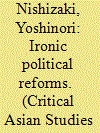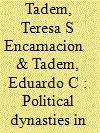|
|
|
Sort Order |
|
|
|
Items / Page
|
|
|
|
|
|
|
| Srl | Item |
| 1 |
ID:
164687


|
|
|
|
|
| Summary/Abstract |
An elected Senate and the party-list system are two institutional innovations of the 1997 Thai Constitution designed to support political reforms. This paper sheds light on one unintended effect of these reforms: they have allowed scores of political families to maintain or even tighten their grip on Parliament. Combining aggregate data and case studies, this paper shows that a sizable number of elected senators and party-list parliamentary members are related, by birth or marriage, to other parliament members elected in the post-1932 period. The well-intended reforms have concentrated parliamentary power in the hands of these families, many of which represent the excesses of Thailand’s full-blown electoral democracy. The survival and resilience of these families diminish reform opportunities by further entrenching corruption, clientelism, violence, and electoral fraud, as well as by deepening dynastic rule that militates against political pluralism and inclusiveness.
|
|
|
|
|
|
|
|
|
|
|
|
|
|
|
|
| 2 |
ID:
148548


|
|
|
|
|
| Summary/Abstract |
The results of the 2013 Philippine mid-term elections highlighted the dominance of political dynasties in the country. With all 80 provinces littered with political families, 74 percent of the elected members of the House of Representatives came from such dynastic groups. Despite overwhelming recognition that political dynasties breed patronage politics and corruption, no substantial steps have been undertaken to address this issue. This article examines the general nature of Philippine political dynasties, the reasons for their continuing existence and their adverse impact on the country. This problem emanates basically from three factors: (1) the political and socio-economic foundations upon which political dynasties are built; 2) the inability to effectively implement Philippine constitutional provisions by enacting an enabling law; and 3) the weakness of potential countervailing forces that would challenge political dynasties.
|
|
|
|
|
|
|
|
|
|
|
|
|
|
|
|
| 3 |
ID:
176134


|
|
|
|
|
| Summary/Abstract |
Political families are common across many countries in Asia, including Pakistan. Politicians from political families (PPFs) make decisions with the goal of maximizing the political prospects of the entire family, in contrast to non-PPFs, who maximize their individual political self-interest. This changes the impact they have on their country. Scholars find that the presence of PPFs is associated with significantly worse development and governance outcomes, including in Pakistan. However, we know much less about their impact on political outcomes. In this paper, we use original data from a 2018 systematic national survey of about 150 Pakistani politicians to investigate PPFs’ support for key democratic institutions and practices. We find that compared to non-PPFs, Pakistani PPFs are significantly more supportive of instrumentally useful institutions and practices such as free and fair elections, an independent judiciary, and a free media, but no different in their low level of support for human rights.
|
|
|
|
|
|
|
|
|
|
|
|
|
|
|
|
| 4 |
ID:
148547


|
|
|
|
|
| Summary/Abstract |
The political family has an entrenched place within the modern political systems of South East Asian states. Current and former national leaders of the Philippines, Thailand, Indonesia and Singapore are members of political dynasties and elsewhere in the region family networks play central roles in the political lives of these nations. To the international community, democracy and electoral politics signals stability and a commitment to shared standards and values for governance. In the emerging South East Asian democracies, however, family, patronage, nepotism and dynasty are also key ingredients within these polities. Some reflect generations-long traditions of political power-sharing regardless of regime type, whilst others are generated and buoyed by the opportunities presented by the democratic and electoral process itself.
|
|
|
|
|
|
|
|
|
|
|
|
|
|
|
|
| 5 |
ID:
148554


|
|
|
|
|
| Summary/Abstract |
The rise to power of political dynasties in regional Indonesia has been the subject of much critical analysis by scholars and journalists, with most seeing the phenomenon as a symptom of the wider democratic shortcomings of the post-Suharto period. This article examines the successes and travails of political dynasties in regional Indonesia by focusing on the province of Central Kalimantan. It begins by defining political dynasty, differentiating it from allied terms, outlining competing scholarly explanations for dynastic formation, and noting the critical issue of inter-generational succession. The article then examines subnational dynasty formation in Central Kalimantan, where in seven out of eight districts in the relevant time period a sitting bupati (district head) attempted to engineer dynastic succession, but succeeded in only two. The examination shows that while political opportunity structure accounts emphasising state and party weakness help explain the explosion of attempts to establish political dynasties in democratic Indonesia, the failure of most such attempts to consolidate inter-generationally indicates that we must be cautious in judging how stable these new political formations will become. Would-be subnational dynasties in Indonesia continue to face formidable competing sources of political authority which make it difficult for them to establish themselves over multiple generations.
|
|
|
|
|
|
|
|
|
|
|
|
|
|
|
|
|
|
|
|
|